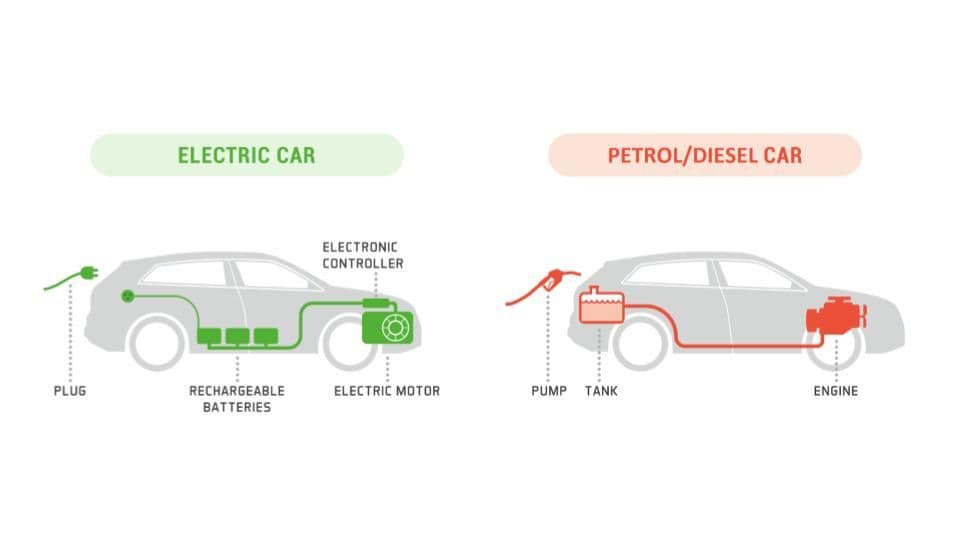When it comes to choosing your next car, should it be electric or petrol?
With the rapid emergence of electric cars, they are quickly becoming a viable and in some cases superior alternative to their petrol equivalents.
This article will outline the pros and cons of each technology and some of the key considerations you'll need to be across when making a decision.
What Is An Electric Car?
From the outside, electric and petrol/diesel (also known as ‘ICE’) cars look more or less the same, under the bonnet however is where they are different.
Electric cars combine a large battery underneath the floor and an electric motor/s to drive the vehicle. It is the simplest powertrain type with the least moving parts – and zero tailpipe emissions. It is estimated EVs have about 200 moving parts compared to 2000 for an ICE car.
Electric cars get their fuel from being ‘charged’. This can be done at home via a power point, wall-mounted charger or at public charging stations. The average charging time can range anywhere from 30 hours (AC Charging) to 30 minutes (DC Fast Charging) for a full charge which will typically give 400 km of range.
Electric cars are by design much simpler machines.

What Is A Petrol Car?
Also known as ICE cars, petrol cars have an engine that uses petrol as fuel. The petrol sparks a combustion process which creates energy that powers the wheels via a gearbox.
Electric Cars vs Petrol Cars: Pros
1. Zero Emissions
EVs are often labelled as zero-emissions transport because no carbon dioxide (CO2) emissions are produced while the car is being driven aka as zero tail-pipe emissions.
Much of the charging however comes from the electricity grid, which is still primarily powered by fossil fuels (coal and gas), therefore in this case it is strictly not zero-emissions by operation.
2. Lower Cost Per Mile Compared To Petrol Cars
Electric cars are significantly cheaper to run for the same distance. This is due to the efficiency of electric cars and the relatively cheaper cost of electricity compared to petrol.
In the following example we’ve compared the cost of charging an electric car across various sources vs filling a petrol car.
The electric option is substantially cheaper for the same distance covered. Relying on public fast chargers will yield a 64 per cent saving, but if you're lucky enough to charge from your own solar system, the saving is 97 per cent.
3. Government Grants Offered On Certain EVs
Electric cars are eligible for a range of government incentives.
At the federal level, electric cars will be eligible for the impending FBT exemption.
At the state level, each state has different incentives and criteria for electric car purchases. Read our guide to Australian EV incentives provides more details on the type of incentives each state has on offer,
4. Minimal Servicing Requirements
Electric cars require less servicing and maintenance compared to a petrol- or diesel-powered vehicles.
EVs don’t require any check and replacement of spark plugs, engine oil and filters, multiple gears, clutch fluids, exhaust system, fuel lines and hoses to the tank, and so on.
Electric Cars vs Petrol Cars: Cons
1. Pricing Tends To Be Higher Than For Similar Petrol Models
EVs on average have a higher upfront cost compared to their ICE equivalents. Depending on the vehicle, up to 40% more than an ‘equivalent’ ICE vehicle. For example the MG ZS EV costs $44,990, its petrol equivalent the MG ZST costs $30,990, a difference of $14,000 (45%).
2. Range Is Lower Than In Most Petrol Cars
Electric cars on average have lower range than their petrol equivalents. The range of electric cars in our database is 430 km being the average compared to 700 km for an average petrol vehicle.
3. Charging Takes Longer Than Filling With Petrol
Electric cars take longer to charge than petrol cars take to fill up. For example, the Ioniq 5, one of the fastest charging EVs takes 18 minutes to provide 245 km of range. For every 100 km, this takes about 5 minutes. Compared to a typical petrol vehicle it will take no more than a minute for every 100 km.
Where this can present problems is if there is a long quee to use the fast charger, with charges taking anywhere up to 45 minutes, you could be waiting a long time!
4. Charging Infrastructure isn’t up to Speed Just Yet
Today, there are less public charging stations than petrol stations, the difference however is closing rapidly.
For those with access to charging at home, public charging infrastructure shouldn’t be a major concern as most EVs should be charged at home, given it’s more convenient and cost-efficient. A survey conducted by Ausgrid found 83% of EV drivers charge at home.
According to Plugshare, there are currently 361 AC and DC public charging stations across Australia from major providers like Chargefox, Evie Networks and Jolt to independent local cafes and shopping centres.
5. Environmental Impact Of Building An EV Can Be More Than An Equivalent Petrol Car
According to Volvo, manufacturing an electric car generates 70 Percent more emissions than Its ICE equivalent. A study by Volvo Motors revealed that the manufacturing process of its C40 Recharge electric coupe-SUV generates 70 percent more emissions than that of the ICE-powered XC40 counterpart. However, when the car’s lifetime is factored in, a breakeven is reached, and the EV’s total carbon footprint is less compared to that of the ICE vehicles.
Electric Cars vs Petrol Cars Pollution

EVs are often labeled as zero-emissions transport because no carbon dioxide (CO2) emissions are produced while the car is being driven. This is a misleading label for a few reasons.
Firstly, the manufacture of electric vehicles has a higher embodied carbon footprint than ICE vehicles, mainly due to the manufacture of the battery. Think of this as the upfront environmental cost.
Secondly, if your EV is charged from the grid, emissions will be emitted. The Australian grid is still predominantly powered by fossil fuels (coal and gas). Think of this as the ongoing environmental cost.
If an EV is going to have a net positive impact relative to an ICE car, it must have a lower total environmental cost (TEC). The emissions savings over the life of its operation needs to be greater than the higher upfront environmental cost.
Total Environmental Cost (TEC) = Upfront Environmental Cost of Manufacturing + Ongoing Environmental Cost of Operations.
As an EV owner, you can positively contribute to sustainable transport by charging your car via renewable energy sources. If you have your own solar system this would mean charging it during the day when the sun is shining. The environmental case for charging from the grid is improving by the day as record levels of renewable energy generation capacity continue to be added. This results in the mix of energy produced having a lower carbon footprint, which incidentally makes the operation of your EV cleaner.
For example if you are charging from the grid, the difference in carbon emissions can be significant, state-by-state. If you're in New South Wales (NSW) where renewable energy comprises 20 per cent of total energy sources, it will be 39 per cent cleaner. In Tasmania, where renewables comprise 83 per cent of total energy, emissions will be 87 per cent lower. If you’re charging from solar panels, it doesn’t matter where you are, it’ll be 100 per cent clean, making your electric car truly zero emissions in operation.
Electric Cars vs Petrol Cars Cost
The biggest hurdle when it comes to the adoption of EVs is the higher upfront cost compared to their ICE equivalents. Why are they more expensive? Because batteries, which comprise up to a third of the cost of an EV, are still expensive. The good news is that battery prices are decreasing rapidly and the upfront cost of an EV and an ICE is expected to be roughly the same by 2025.
Today, however, electric vehicles cost more. Depending on the vehicle, up to 40% more than an ‘equivalent’ ICE vehicle.
The upfront cost, however, is only a part of the total cost equation. Over the life of a car, the upfront cost comprises 45% of the total cost of ownership (TCO). To know the true cost of car ownership you need to consider the ongoing running costs (fuel, service, maintenance) as well.
The cost to run an electric vs petrol are on average much lower. Increasingly, we are finding the overall ownership costs (TCO) of EVs is lower than ICE cars. Firstly, this means that over the life of the vehicle, an EV will cost less to own. Secondly, the additional upfront cost for the EV will be 'repaid' from the savings from lower running costs. Yes, despite their higher upfront cost, EVs can be cheaper to own and operate than their ICE equivalents in the majority of cases.
We conducted payback analysis for the MG ZS EV and found that it woudl take about 5 years to repay the electric premium from lower operating costs for the average driver.
Electric Cars vs Petrol Cars Range
‘Range anxiety’ is one of the biggest fears people have about Electric Cars (EVs). Is this fear justified or is it an overreaction? How far can electric cars travel? We’ll break it down in this article.
Yes, on average, EVs have a shorter range than ICE cars. People also tend to overestimate the range they need to meet their day-to-day driving needs. Contrary to common belief, modern EVs have a good range (refer next section for the full list), enough to meet the daily driving needs of most people.
The range of electric cars in our database ranges from 200 km to 652 km, with 430 km being the average.
Electric Cars vs Petrol Cars Bottom Line
Whether electric cars make sense for you depends on how you use your car and your access to charging infrastructure. For day to day driving and commuting around urban areas, EVs most likely will be the better choice.
If you are one that regularly commutes longer distances (400 km+) daily, the EV charging infrastructure might not be ready yet.
About the author
Stay up to date with the latest EV news
- Get the latest news and update
- New EV model releases
- Get money savings-deal

